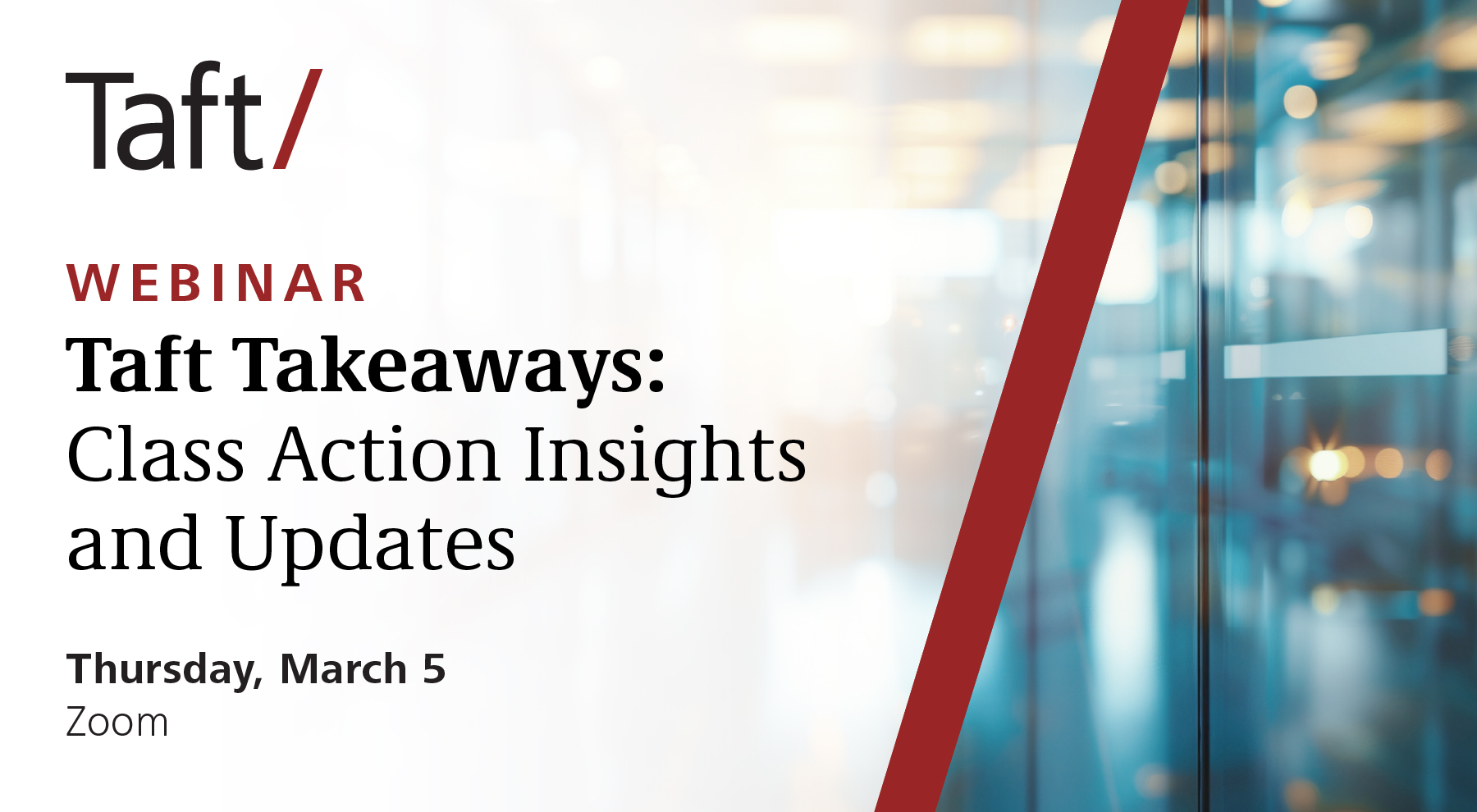Join Taft partners Rob Bilott, Isaac Colunga, Ian Fisher, Ron Holman, Gillian Lindsay, Andrew Murphy, and Mike Zbiegien for a complimentary webinar where they will discuss the topics below.
Date: Thursday, March 5, 2026
Time: 12 p.m. – 1:15 p.m. ET
Register HERE.
AGENDA:
12:00 – 12:05 p.m.
Introduction and Agenda Overview – Taft’s Class Action Litigation Team
12:05 – 12:15 p.m.
Getting Their “Day in Court?” The Circuit Split Over Standing for Absent Class Members After TransUnion
The Circuits are split as to when and how the Courts should determine whether an absent class member needs to have standing to proceed as class members. Taft partner Ron Holman will examine the positions taken by the divided courts, which ultimately will be decided by the Supreme Court.
- Presenter: Ron Holman
12:15 – 12:25 p.m.
What Has the Plaintiff’s Bar Been Up To?
A brief introduction to the most annoying class actions that plaintiffs filed in 2025 and will continue filing in 2026. Taft partner Isaac Colunga will cover the jurisdictions, allegations, and outcomes of each. He’ll also touch on how to avoid them (if possible).
- Presenter: Isaac Colunga
12:25 – 12:35 p.m.
BIPA is “Dumber”
In this update, Taft partners Ian Fisher and Gillian Lindsay will discuss latest developments under the Illinois Biometric Information Privacy Act (BIPA) and where they see the statute going in the near future. Fisher and Lindsay will discuss recent rulings on virtual try on (VTO) technology, the healthcare exception for fingerprint access to hospital drug trays, and the retroactive application of the 2024 amendment.
- Presenters: Ian Fisher and Gillian Lindsay
12:35 p.m. – 12:45 p.m.
The ERISA Surcharge Debate: Circuit Split and Class Action Strategy
Recent ERISA class actions are challenging health plans’ use of “surcharges” related to wellness programs, asserting violations of ERISA Section 702 and related regulations. This has important implications for how employers and health plan sponsors communicate regarding these plans.
- Presenter: Mike Zbiegien
12:45 – 12:55 p.m.
Navigating Employment Class Actions: Strategies, Challenges, and Emerging Issues
Taft partner Andrew Murphy will discuss employment-related class and collective actions, highlighting how these cases differ from other types of class actions and exploring key procedural and strategic considerations unique to this area. The session will also address emerging trends and developments.
- Presenter: Andrew Murphy
12:55 – 1:05 p.m.
“Forever Chemicals” and Consumer Class Actions: The Next Chapter in PFAS Litigation
Litigation over “forever chemicals,” also known as PFAS (per- and polyfluoroalkyl substances), continues to expand nationwide. What began largely as personal injury and environmental contamination cases—often involving municipal water systems—has evolved into a surge of consumer class actions invoking state and federal consumer protection laws. In this session, Taft partner Rob Bilott will discuss the latest developments in PFAS litigation, including recent settlements, regulatory actions, and the growing focus on consumer product claims. Bilott, who first brought global attention to PFAS contamination, continues to play a leading role in shaping this complex and evolving area of law.
- Presenter: Rob Bilott
This seminar is pending approval for 1.15 hours of CLE credit in Arizona, Colorado, Florida, Georgia, Illinois, Indiana, Kentucky, Ohio, and Minnesota. There is no cost to attend.
Questions? Contact Megan Riley at mriley@taftlaw.com.











